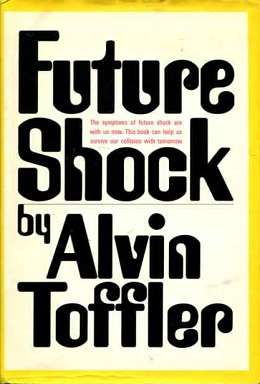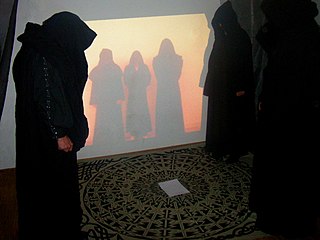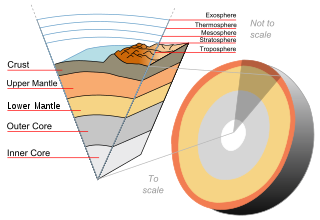Related Research Articles

Cyberspace is an interconnected digital environment. It is a type of virtual world popularized with the rise of the Internet. The term entered popular culture from science fiction and the arts but is now used by technology strategists, security professionals, governments, military and industry leaders and entrepreneurs to describe the domain of the global technology environment, commonly defined as standing for the global network of interdependent information technology infrastructures, telecommunications networks and computer processing systems. Others consider cyberspace to be just a notional environment in which communication over computer networks occurs. The word became popular in the 1990s when the use of the Internet, networking, and digital communication were all growing dramatically; the term cyberspace was able to represent the many new ideas and phenomena that were emerging. As a social experience, individuals can interact, exchange ideas, share information, provide social support, conduct business, direct actions, create artistic media, play games, engage in political discussion, and so on, using this global network. Cyberspace users are sometimes referred to as cybernauts.
The noosphere is a philosophical concept developed and popularized by the biogeochemist Vladimir Vernadsky and philosopher and Jesuit priest Pierre Teilhard de Chardin. Vernadsky defined the noosphere as the new state of the biosphere, and described it as the planetary "sphere of reason". The noosphere represents the highest stage of biospheric development, that of humankind's rational activities.

Future Shock is a 1970 book by American futurist Alvin Toffler, written together with his wife Adelaide Farrell, in which the authors define the term "future shock" as a certain psychological state of individuals and entire societies, and a personal perception of "too much change in too short a period of time". The book, which became an international bestseller, has sold over 6 million copies and has been widely translated.
Real life is a phrase used originally in literature to distinguish between the real world and fictional, virtual or idealized worlds, and in acting to distinguish between actors and the characters they portray. It has become a popular term on the Internet to describe events, people, activities, and interactions occurring offline; or otherwise not primarily through the medium of the Internet. It is also used as a metaphor to distinguish life in a vocational setting as opposed to an academic one, or adulthood and the adult world as opposed to childhood or adolescence.
The ideosphere—like the noosphere —is the metaphysical 'place' where thoughts, theories, ideas, and ideation are regarded to be created, evaluated, and evolved.

Technopaganism, as described by Victoria Dos Santos, is "a term encompassing a variety of practices and expressions related to contemporary paganism, popular culture, and spiritual pursuits in digital environments." The Internet, for instance, is considered by some technopagans to have spiritual significance or unique magical applications. Techno music may also be involved in technopaganism. Modern tribal and urban primitive movements such as cyberpunk, urban shamanism and rave culture are associated with electronic dance music.

Biogeochemistry is the scientific discipline that involves the study of the chemical, physical, geological, and biological processes and reactions that govern the composition of the natural environment. In particular, biogeochemistry is the study of biogeochemical cycles, the cycles of chemical elements such as carbon and nitrogen, and their interactions with and incorporation into living things transported through earth scale biological systems in space and time. The field focuses on chemical cycles which are either driven by or influence biological activity. Particular emphasis is placed on the study of carbon, nitrogen, oxygen, sulfur, iron, and phosphorus cycles. Biogeochemistry is a systems science closely related to systems ecology.
The semiosphere is a concept in biosemiotic theory, according to which - contrary to ideas of nature determining sense and experience - the phenomenal world is a creative and logical structure of processes of semiosis where signs operate together to produce sense and experience.
Internet identity (IID), also online identity, online personality, online persona or internet persona, is a social identity that an Internet user establishes in online communities and websites. It may also be an actively constructed presentation of oneself. Although some people choose to use their real names online, some Internet users prefer to be anonymous, identifying themselves by means of pseudonyms, which reveal varying amounts of personally identifiable information. An online identity may even be determined by a user's relationship to a certain social group they are a part of online. Some can be deceptive about their identity.
Logosphere is an adaptation of the concepts biosphere and noosphere: logosphere is derived from the interpretation of words' meanings, conceptualized through an abstract sphere.

The following outline is provided as an overview of and topical guide to Earth science:
Online ethnography is an online research method that adapts ethnographic methods to the study of the communities and cultures created through computer-mediated social interaction. As modifications of the term ethnography, cyber-ethnography, online ethnography and virtual ethnography designate particular variations regarding the conduct of online fieldwork that adapts ethnographic methodology. There is no canonical approach to cyber-ethnography that prescribes how ethnography is adapted to the online setting. Instead individual researchers are left to specify their own adaptations. Netnography is another form of online ethnography or cyber-ethnography with more specific sets of guidelines and rules, and a common multidisciplinary base of literature and scholars. This article is not about a particular neologism, but the general application of ethnographic methods to online fieldwork as practiced by anthropologists, sociologists, and other scholars.

Luciano Floridi is an Italian and British philosopher. He is the director of the Digital Ethics Center at Yale University. He is also a Professor of Sociology of Culture and Communication at the University of Bologna, Department of Legal Studies, where he is the director of the Centre for Digital Ethics. Furthermore, he is adjunct professor at the Department of Economics, American University, Washington D.C. He is married to the neuroscientist Anna Christina Nobre.
The philosophy of information (PI) is a branch of philosophy that studies topics relevant to information processing, representational system and consciousness, cognitive science, computer science, information science and information technology.

Information is an abstract concept that refers to something which has the power to inform. At the most fundamental level, it pertains to the interpretation of that which may be sensed, or their abstractions. Any natural process that is not completely random and any observable pattern in any medium can be said to convey some amount of information. Whereas digital signals and other data use discrete signs to convey information, other phenomena and artifacts such as analogue signals, poems, pictures, music or other sounds, and currents convey information in a more continuous form. Information is not knowledge itself, but the meaning that may be derived from a representation through interpretation.
Novel ecosystems are human-built, modified, or engineered niches of the Anthropocene. They exist in places that have been altered in structure and function by human agency. Novel ecosystems are part of the human environment and niche, they lack natural analogs, and they have extended an influence that has converted more than three-quarters of wild Earth. These anthropogenic biomes include technoecosystems that are fuelled by powerful energy sources including ecosystems populated with technodiversity, such as roads and unique combinations of soils called technosols. Vegetation associations on old buildings or along field boundary stone walls in old agricultural landscapes are examples of sites where research into novel ecosystem ecology is developing.
An inforg is an informationally embodied organism, entity made up of information, that exists in the infosphere. These informationally embodied organisms are also called natural agents.
Digital civics refers to a range of ethical and responsible civic behaviours, citizenship, or democratic engagement in the digital realm. The term itself is still establishing currency.
The datasphere is a multidisciplinary concept that first appeared in the 1980s. While many terms have been adopted to describe the digital world – terms such as the Internet, cyberspace, metaverse – the various concepts of the datasphere seem to address the growing dependency of human activities on data, as well as approach the digital world in a holistic manner. Related terms include data economy, data governance, data commons, and data management.
Onlife is a neologism coined by philosopher Luciano Floridi in 2012. The concept is a portmanteau of online and life referring to "the new experience of a hyperconnected reality within which it is no longer sensible to ask whether one may be online or offline". The term has taken inspiration from Hannah Arendt's The Human Condition (1958) "to better understand and articulate the interactions of [Information and communications technology] with notions of public space in particular and our contemporary lifeworld more generally". The term gained significant recognition with the publication of the 2015 Onlife Manifesto, edited by Floridi himself. The manifesto brought together academics from across Europe to discuss the social effects, policy-making, ethical implications, and legal advancements related to hyperconnectivity in Europe and beyond.
References
- ↑ Floridi, Luciano. 2001. "Ethics in the Infosphere." The Philosophers' Magazine 16 (2001):18-19.
- ↑ "The Infosphere - Bibliography - PhilPapers". philpapers.org. Retrieved 2021-03-27.
- ↑ Van der Veer Martens, Betsy. 2015. "An illustrated introduction to the infosphere Archived 2018-07-22 at the Wayback Machine ." Library Trends 63(3):317–61.
- ↑ Boulding, Kenneth E. 1970. Economics as a Science. New York: McGraw-Hill.
- ↑ R.Z. Sheppard (1971-04-12), "Rock Candy", Time Magazine, archived from the original on December 21, 2008, retrieved 2010-05-05
- ↑ Vedro, Steven. 2007. Digital Dharma: A User's Guide to Expanding Consciousness in the Age of the Infosphere. Quest. Lay summary.
- ↑ Floridi, Luciano. A Look into the Future Impact of ICT on our Lives
- 1 2 Luciano Floridi (1999), Philosophy and Computing: An introduction. New York: Routledge.
- ↑ Charles Seife (2006), Decoding the Universe: How the New Science of Information Is Explaining Everything in the Cosmos, from Our Brains to Black Holes, p. 2
- ↑ IBM InfoSphere products